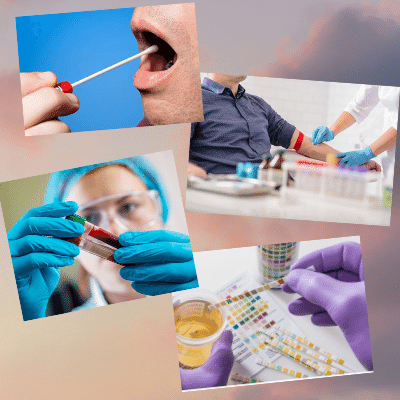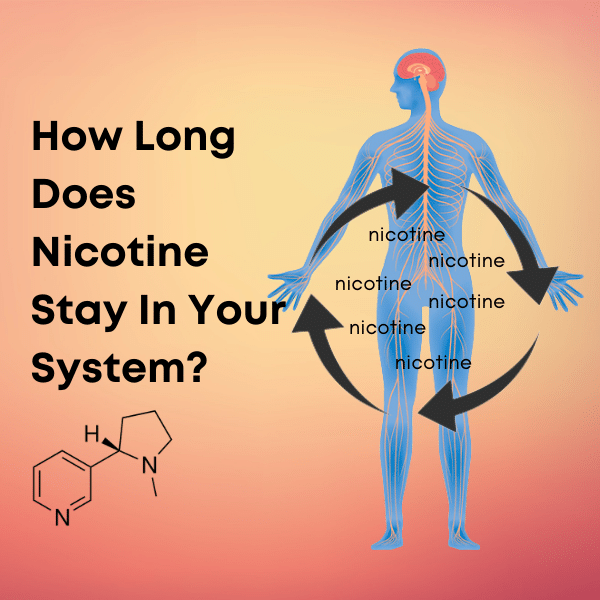Nicotine concentrations vary in vape juice. You can find vape juice that is nicotine free to vape juice that has concentrations as high as 50 mg. Depending on the concentration, nicotine can linger in the body for a couple of days to an entire year. How long nicotine stays in your system greatly depends on the type of vape juice you use and its nicotine concentration.
How long does nicotine stay in your system?
Whether you vape, smoke, chew tobacco or inhale nicotine through second hand smoke, it is all absorbed into your bloodstream. The nicotine is then broken down into by-products such as cotinine and anabasine which can linger in the bloodstream for months. There are many factors that go into how long nicotine stays in your system from vaping.
Factors that determine how long nicotine stays in your system
The type of vape juice that you use
The type of vape juice you use plays a huge role in how long nicotine stays in your system. Some important questions to consider when determining how long it takes your body to flush out nicotine and how much nicotine you may be consuming each time you vape are:
- How often do you vape?
- Are you using nicotine free vape juice, nicotine salts or freebase nicotine?
- If your vape juice contains nicotine, what concentration of nicotine do you prefer?
How often you do you vape using nicotine containing products
Nicotine users are typically divided into three categories:
- Heavy vape users
- Vape multiple times a day on a weekly basis
- Use vape juice with high nicotine concentrations
- Moderate vape users
- Vape a few times a day, every other day
- Use vape juice with medium nicotine content
- Light vape user
- Vape a handful of times a week
- Use low to no nicotine vape juice
In heavy vape users, traces of nicotine and cotinine can be detected for as long as 12 months after you last consumed nicotine. Whereas for light vape users, nicotine and cotinine is flushed out of your system within three to five days of your last consumption. It can take anywhere from one to four weeks since last consumption, for moderate users to be clear of nicotine and cotinine.
What is the nicotine concentration that you consume
The higher the nicotine concentration you consume, the more will be absorbed into the bloodstream, the longer it will take to leave your system. People who use vape juices with 3mg nicotine will be able to flush out the nicotine faster than people who use 12mg and 50mg nicotine vape juice.
Genetics
Certain biological and physiological factors play a role in how long nicotine stays in the body. Some research suggests that due to genetics, certain ethnic groups can metabolise nicotine faster than others. It is also believed that hormones play a role in the rate at which nicotine is metabolised. Studies show that women, due to high levels of oestrogen, are capable of metabolising nicotine and cotinine faster than men.
Age and liver function have also been identified to affect nicotine metabolism. As you get older, your liver function starts to deteriorate; this slows down your metabolism and results in toxins like nicotine and cotinine taking longer to leave your system.
Medications
Medication can also impact how your body metabolises nicotine. Antibiotics and barbiturates can increase metabolism, resulting in nicotine being flushed out of the body faster. While, high blood pressure medicine and antifungals, typically slow down metabolism and can result in nicotine lingering in the body for longer.
What are the different nicotine testing methods

Nicotine salts and freebase nicotine come in various concentrations, with most people preferring 12mg nicotine concentration. At that nicotine concentration, the average user will have approximately 10ng/mL of nicotine in their bloodstream, while the average non-smoker will have less than 1ng/mL in their system.
There are a few nicotine tests available on the market. These range from urine tests to saliva tests, and they are normally qualitative, not quantitative. Majority of the tests that are available over the counter, only detect the presence of nicotine and its by-products. The tests do not measure the amount or concentration of nicotine and nicotine by-products in the body.
There are a few different tests that can be used to detect cotinine. The two most common are a urine test and a blood test. Due to the thorough nature of these tests, the results may take a few days to come back. Testing urine or blood is considered a quantitative test as the tests not only detect the presence of cotinine but can also measure the concentration of it.
These tests can also include saliva and hair to detect the presence of cotinine. In saliva, they can detect cotinine up to 4 days after using nicotine. Testing hair provides a broader view of nicotine use, as traces of cotinine can be available even months after the last consumption of nicotine.
Can I avoid testing positive for nicotine, if so how?
To avoid testing positive for nicotine, you have to stop using nicotine products. Other than that, it is impossible to avoid testing positive for nicotine. This is because nicotine tests don’t test for nicotine but rather they test for cotinine and anabasine which are two by-products of nicotine and thus linger in the body for significantly longer. The by-products are easily detectable by tests and don’t have to be in high concentrations to be detected.
If you use vape juice that contains nicotine and don’t want to test positive for nicotine, your only solution is to switch to nicotine-free vape juice and wait a few months for your body to completely flush out the cotinine and anabasine that is already in the body.
Do insurance companies test for nicotine?

Yes, they do. The majority of life insurance providers will subject their customers to a medical exam. In that exam, they will ask you to provide a sample of your blood and then they will conduct a myriad of tests. One of those tests will be to detect the presence of cotinine.
When it comes to life insurance, they assess your overall health and lifestyle, this includes your smoking habits. Compared to their non-smoking counterparts, nicotine users are at a higher risk of developing lifelong illnesses such as lung disease, heart disease, cancer, and chronic obstructive pulmonary disease. As a result, nicotine users will pay more for life insurance.
Nicotine can be highly addictive, as such, Vaperite does not support the excessive use of nicotine. We merely provide valuable information for our customers to make informed decisions.
For more great products and devices, visit Vaperite and Vapeshop, South Africa’s leading vape shop and cannabis paraphernalia outlet chain.





